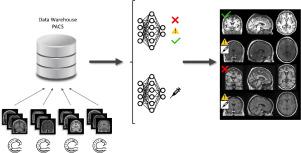Medical Image Analysis ( IF 10.7 ) Pub Date : 2021-09-03 , DOI: 10.1016/j.media.2021.102219 Simona Bottani 1 , Ninon Burgos 2 , Aurélien Maire 3 , Adam Wild 2 , Sebastian Ströer 4 , Didier Dormont 5 , Olivier Colliot 2 ,

|
Many studies on machine learning (ML) for computer-aided diagnosis have so far been mostly restricted to high-quality research data. Clinical data warehouses, gathering routine examinations from hospitals, offer great promises for training and validation of ML models in a realistic setting. However, the use of such clinical data warehouses requires quality control (QC) tools. Visual QC by experts is time-consuming and does not scale to large datasets. In this paper, we propose a convolutional neural network (CNN) for the automatic QC of 3D T1-weighted brain MRI for a large heterogeneous clinical data warehouse. To that purpose, we used the data warehouse of the hospitals of the Greater Paris area (Assistance Publique-Hôpitaux de Paris [AP-HP]). Specifically, the objectives were: 1) to identify images which are not proper T1-weighted brain MRIs; 2) to identify acquisitions for which gadolinium was injected; 3) to rate the overall image quality. We used 5000 images for training and validation and a separate set of 500 images for testing. In order to train/validate the CNN, the data were annotated by two trained raters according to a visual QC protocol that we specifically designed for application in the setting of a data warehouse. For objectives 1 and 2, our approach achieved excellent accuracy (balanced accuracy and F1-score >90%), similar to the human raters. For objective 3, the performance was good but substantially lower than that of human raters. Nevertheless, the automatic approach accurately identified (balanced accuracy and F1-score >80%) low quality images, which would typically need to be excluded. Overall, our approach shall be useful for exploiting hospital data warehouses in medical image computing.
中文翻译:

用于临床数据仓库的脑 T1 加权磁共振图像的自动质量控制
迄今为止,许多关于用于计算机辅助诊断的机器学习 (ML) 的研究大多局限于高质量的研究数据。临床数据仓库从医院收集常规检查,为在现实环境中训练和验证 ML 模型提供了巨大的希望。然而,使用此类临床数据仓库需要质量控制 (QC) 工具。专家的视觉 QC 非常耗时,并且无法扩展到大型数据集。在本文中,我们提出了一种卷积神经网络 (CNN),用于大型异构临床数据仓库的 3D T1 加权脑 MRI 的自动 QC。为此,我们使用了大巴黎地区医院的数据仓库(Assistance Publique-Hôpitaux de Paris [AP-HP])。具体而言,目标是:1)识别不是正确的 T1 加权脑 MRI 的图像;2) 确定注入钆的收购;3) 对整体图像质量进行评分。我们使用 5000 张图像进行训练和验证,并使用一组单独的 500 张图像进行测试。为了训练/验证 CNN,两名训练有素的评估者根据我们专门为数据仓库设置应用而设计的视觉 QC 协议对数据进行了注释。对于目标 1 和 2,我们的方法实现了出色的准确度(平衡准确度和 F1 分数 >90%),类似于人类评估者。对于目标 3,性能很好,但远低于人类评估者。然而,自动方法准确地识别(平衡精度和 F1 分数 > 80%)低质量图像,通常需要排除。全面的,











































 京公网安备 11010802027423号
京公网安备 11010802027423号